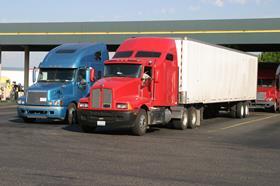
The French government is introducing road charges for lorriesthis autumn, ranging from 9 to 15 centimes/km on once free but busy national and secondary roads.
Dubbed the 'écotaxe', the charges are scheduled to come into force on 1 October for all lorries over 3.5 tonnes, regardless of where vehicles are registered.
Compliance will involve fitting hundreds of thousands of vehicles with proprietary GPS counters. Non-compliance will incur roadside fines up to €750.
French hauliers will be required to fit the GPS devices. Foreign hauliers will have to comply too when driving on chargeable roads. In practice, the newly designated roads complement the motorway system and cover transverse routes. Since link roads at all but two Channel ports will become chargeable, fitting a GPS counter will be unavoidable for hauliers coming to the UK.
Most of the affected roads are cross-country routes, such as the N10 that runs north east from Bordeaux to Paris and is a free alternative to the A10 motorway for traffic coming up from Bilbao. Transverse routes to be charged include the main east-west access to Brittany, which has no motorway concessions. The French motorway system is to be écotaxed, but differently.
There are concerns across France that the 1 October deadline is “impossible”, according to Philippe Mangin, president of Coop de France, who speaks for nearly 3,000 food producer cooperatives. “We’ll never be ready in time,” he told the French president François Hollande last week. “The écotaxe represents a 5-8 per cent rise in transport costs.” Since the hauliers will pass it on to those who load the lorries, the supply chain will be footing the bill, Mangin argues.
Three out of four French farmers are members of a co-operative of some sort. For the Coop de France membership, compliance means fitting 600,000 lorries with GPS boxes at a time when many are busy with harvesting and transport is in short supply. Peasant body Co-ordination Rurale, which has a horticultural section, goes further, advocating free passage for agricultural products, over and above the exemption already granted to the dairy sector for milk collection lorries.
The French government’s current plan is to phase in the écotaxe at a reduced rate in the autumn and to raise it by 10 per cent on 1 January 2014. The tax bands appear in the table, along with the sliding scale for different emission standards, which can add up to 20 per cent to the underlying rate of écotaxe charged.



